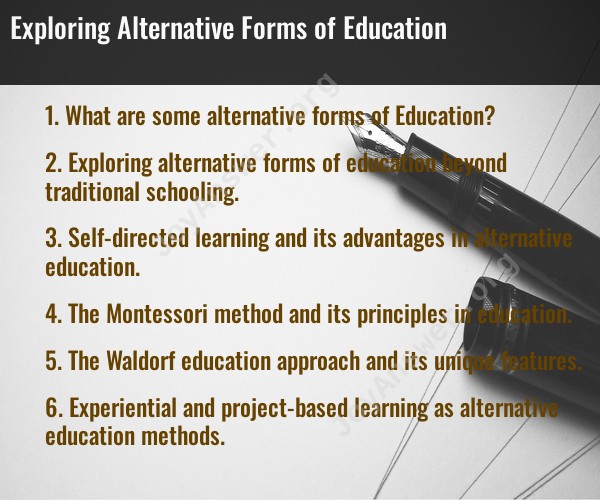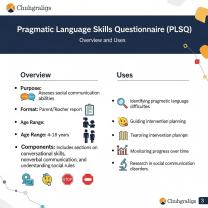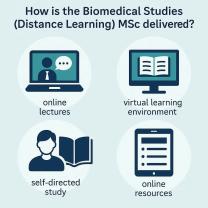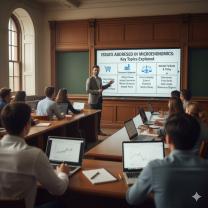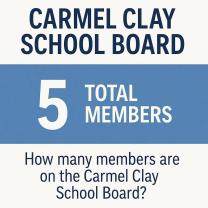What are some alternative forms of Education?
Alternative forms of education provide different approaches to learning and can be tailored to meet individual needs and preferences. These alternatives offer alternatives to traditional classroom-based education. Here are some common forms of alternative education:
Homeschooling: Parents or guardians take on the primary responsibility for their child's education. Homeschooling allows for a highly customizable curriculum and individualized learning.
Online Education: Online learning platforms and virtual schools provide access to educational materials and instruction over the internet. Students can work at their own pace and access resources from anywhere with an internet connection.
Montessori Education: Montessori schools emphasize self-directed learning, hands-on activities, and mixed-age classrooms. They encourage children to explore their interests and develop at their own pace.
Waldorf Education: Waldorf schools focus on holistic education, integrating arts, movement, and academics. The curriculum is designed to align with a child's developmental stages.
Unschooling: Unschooling is a philosophy of education that emphasizes self-directed learning. Students are encouraged to pursue their interests, and learning is often integrated into daily life and activities.
Charter Schools: These publicly funded schools offer an alternative to traditional public schools. Charter schools may have specialized curricula or teaching methods.
Project-Based Learning (PBL): PBL is an instructional approach where students work on projects to gain knowledge and skills. It emphasizes problem-solving, collaboration, and real-world applications.
Dual Enrollment: High school students can enroll in college courses for credit, allowing them to get a head start on their college education.
Community Colleges: Community colleges offer affordable, flexible, and accessible education for a wide range of students, including adult learners and those seeking vocational training.
Trade and Technical Schools: These institutions provide specialized training and education for careers in fields like mechanics, healthcare, and technology.
Open Education Resources (OER): OER are free or low-cost learning materials available online. They include textbooks, videos, and other educational resources that can be used for self-directed learning or in a classroom setting.
Outdoor Education: Outdoor and nature-based programs emphasize learning in natural environments. They may involve activities like camping, hiking, and environmental education.
Art and Music Schools: These schools focus on the arts, offering specialized training in fields like visual arts, music, dance, and theater.
Language Immersion Schools: In these schools, students are immersed in a foreign language to promote bilingualism and cultural understanding.
Self-Directed Learning Centers: These centers provide resources and guidance for individuals who want to pursue self-directed education. They often serve as a supportive environment for independent learners.
Home Education Cooperatives: These are groups of homeschooling families who come together to share resources, knowledge, and social experiences.
Mobile and Traveling Education: Some families choose to travel the world and provide education for their children through real-world experiences, often referred to as "worldschooling."
Distance Learning Programs: Many colleges and universities offer distance education programs, allowing students to earn degrees online without being physically present on campus.
Each of these alternative forms of education has its advantages and may be a better fit for certain individuals or situations. The choice of educational approach often depends on individual learning styles, goals, and preferences.
Exploring alternative forms of education beyond traditional schooling
Traditional schooling is not the only way to learn. There are many alternative forms of education that can provide a high-quality education that is tailored to the individual needs of students.
Self-directed learning is a type of education where students take charge of their own learning. They set their own goals, choose their own materials, and decide how they want to learn. Self-directed learning can be done at any age and in any setting.
Some of the advantages of self-directed learning include:
- Flexibility: Students can learn at their own pace and on their own schedule.
- Personalization: Students can tailor their learning to their own interests and needs.
- Motivation: Students are more likely to be motivated when they are in control of their own learning.
- Creativity: Students can be more creative in their learning when they are not limited by a traditional curriculum.
The Montessori method is a type of education that is based on the principles of respect for the child, freedom within limits, and prepared environments. Montessori classrooms are typically set up with different learning centers where students can choose their own activities. Montessori teachers act as guides, helping students to learn and grow at their own pace.
The Waldorf education approach is a type of education that is based on the belief that the whole child should be educated, not just the intellect. Waldorf schools focus on developing students' academic, artistic, and social skills. Waldorf classrooms are typically filled with natural materials and Waldorf teachers use a variety of teaching methods, including storytelling, singing, and crafts.
Experiential and project-based learning are types of education that focus on hands-on learning. Experiential learning involves learning through experience, such as field trips and internships. Project-based learning involves learning through projects, such as building a robot or writing a book.
The benefits of alternative education
Alternative forms of education can offer a number of benefits to students, including:
- A more personalized learning experience: Alternative schools can tailor their programs to the individual needs of students.
- A more focused learning environment: Alternative schools can provide a more focused learning environment for students who are interested in specific subjects or who have special needs.
- A more supportive learning environment: Alternative schools can provide a more supportive learning environment for students who are struggling in traditional schools.
- A more engaging learning experience: Alternative schools can use a variety of teaching methods to make learning more engaging for students.
Overall, alternative forms of education can provide a high-quality education that is tailored to the individual needs of students.
